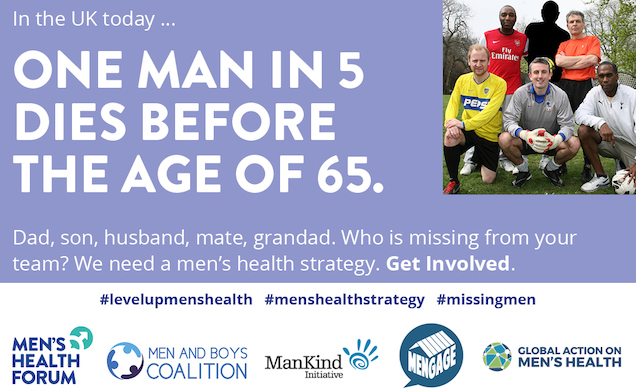Beat Stress
Buy Beat Stress, Feel Better - men's health made easy (as an individual copy, on Kindle or in boxes of 100)
The government is promising to publish a ten-year plan for mental health and wellbeing this year alongside a separate suicide prevention plan. Let’s hope this survives the change of leadership.
This week the Forum was invited, along with many other groups and organisations, to a short meeting with the Department of Health and Social Care (DHSC) to discuss both documents. We heard about some of the excellent work being done out there, none of it provided by the state, most of it under-funded.
The reason men gravitate towards many of these informal, non-statutory services like men’s clubs or men’s groups or men’s sheds is that in civic society there aren’t many genuinely safe places for men to explore their mental health challenges. It’s easy to say ‘it’s good to talk’. But if, by talking, men increase their chances of losing their job, of missing the next promotion or of being denied access to their kids, they’re clearly not going to open up.
Our patron Professor Alan White made the point that far fewer men than women are being diagnosed with common mental health problems and yet far more men than women are taking their own lives. This suggests there might be a problem with the diagnosis of ‘common mental health problems’. He called for diagnostic criteria that understand that behaviours such as excessive drinking, addictions and violence may primarily be symptoms of mental health problems rather than matters for the criminal justice system. Indeed, it makes sense for a whole host of reasons including financial ones for us to identify and intervene in men’s mental health challenges before they escalate to crimes. As it is, if you want to find a good-sized cohort of men with mental health problems, large and small, the best place to look is your local nick.
Because men are more likely than women to express their inner pain in anti-social ways, it’s easier to blame men and their so-called ‘toxic masculinity’ (whatever that means) than it is to improve services. Advocates of small government have a vested interest in this: it’s all down to individual failings, nothing to do with us, mate.
But, of course, individualism and what you might call the myth of meritocracy are part of the problem. We’re always told that hard work will bring success. So if you’re working your guts out at two or three jobs and still can’t afford to feed your family, it’s hardly surprising that you feel like a failure. If, on top of that, you’ve been fed a load of old-fashioned notions about men - bread-winner, strong and silent and so on - you’re not likely to talk about these feelings either.
Of course, none of this means that men don’t need to take personal responsibility. If you’re behaving in ways that are dangerous to yourselves and others, it’s up to you to stop them. If these behaviours are based on the way you think - and particularly what you think it means to be a man - you need to change the way you think.
We need an approach to male mental health that understands men, understands their socialisation (perhaps some serious programmes to address adverse childhood events), understands their diversity, understands how their lives are and understands the pressures they’re under in Britain today and, having done that, provides the services that respond to all this. If that means, in part, decent government funding for non-statutory services where men feel safer, there are plenty out there. As the DHSC now knows.
And, of course, we also told them they need a men's health strategy to lead the way.
|
The Men’s Health Forum need your support It’s tough for men to ask for help but if you don’t ask when you need it, things generally only get worse. So we’re asking. In the UK, one man in five dies before the age of 65. If we had health policies and services that better reflected the needs of the whole population, it might not be like that. But it is. Policies and services and indeed men have been like this for a long time and they don’t change overnight just because we want them to. It’s true that the UK’s men don’t have it bad compared to some other groups. We’re not asking you to ‘feel sorry’ for men or put them first. We’re talking here about something more complicated, something that falls outside the traditional charity fund-raising model of ‘doing something for those less fortunate than ourselves’. That model raises money but it seldom changes much. We’re talking about changing the way we look at the world. There is nothing inevitable about premature male death. Services accessible to all, a population better informed. These would benefit everyone - rich and poor, young and old, male and female - and that’s what we’re campaigning for. We’re not asking you to look at images of pity, we’re just asking you to look around at the society you live in, at the men you know and at the families with sons, fathers and grandads missing. Here’s our fund-raising page - please chip in if you can. |

LEVEL UP MEN'S HEALTH
We need a men's health strategy
PARLIAMENTARY ENQUIRY 2023
#levelupmenshealth
#menshealthstrategy
#missingmen